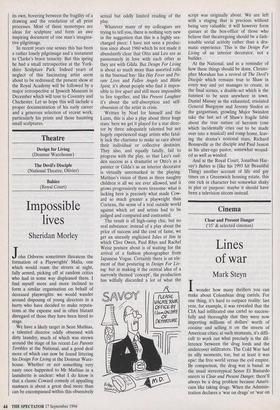Theatre
Design for Living (Donmar Warehouse) The Devil's Disciple (National Theatre, Olivier) Babies (Royal Court)
Impossible lives
Sheridan Morley
John Osborne sometimes threatens the formation of a Playwrights' Mafia, one which would roam the streets at night, fully armed, picking off at random critics who had in some way displeased them. I find myself more and more inclined to form a similar organisation on behalf of deceased playwrights: we would wander around disposing of young directors in a hurry who have decided to make reputa- tions at the expense and in often blatant disregard of those they have been hired to stage.
We have a likely target in Sean Mathias, a talented director oddly obsessed with dirty laundry, much of which was strewn around the stage of his recent Les Parents Terribles at the National, and a good deal more of which can now be found littering his Design For Living at the Donmar Ware- house. Whether or not something very nasty once happened to Mr Mathias in a laundrette is unclear: what I do know is that a classic Coward comedy of appalling manners is about a great deal more than can be encompassed within this obsessively sexual but oddly limited reading of the play.
Whatever many of my colleagues are trying to tell you, there is nothing very new in the suggestion that this is a highly sex- charged piece: I have not seen a produc- tion since about 1960 which hs not made it abundantly clear that Otto and Leo are as passionately in love with each other as they are with Gilda. But Design For Living is about so much more than assorted rolls in the bisexual hay: like Hay Fever and Pri- vate Lives and Fallen Angels and Blithe Spirit, it's about people who find it impos- sible to live apart and still more impossible to live together, and like Present Laughter it's about the self-absorption and self- obsession of the artist in crisis.
Written by Noel for himself and the Lunts, this is also a play about three huge stars: here we get it played for a star direc- tor by three adequately talented but not hugely experienced stage artists who fatal- ly lack the charisma to make us care about their individual or collective destinies. They also, and equally fatally, fail to progress with the play, so that Leo's sud- den success as a dramatist or Otto's as a painter or Gilda's as an interior decorator is virtually unremarked in the playing. Mathias's vision of them as three naughty children is all we are ever allowed, 'and it grows progressively more tiresome: what is lacking here is precisely what made Cow- ard so much greater a playwright than Cocteau, the sense of a real outside world against which art and artists had to be judged and compared and contrasted.
The result is all high-camp chic, but no real substance: instead of a play about the price of success and the cost of fame, we get an uneasily anglicised Jules et Jim in which Clive Owen, Paul Rhys and Rachel Weisz posture about is of waiting for the arrival of a fashion photographer from Japanese Vogue. Certainly there is an ele- ment of that posturing in Design For Liv- ing: but in making it the central idea of a narrowly themed 'concept', the production has wilfully discarded a lot of what the script was originally about. We are left with a staging that is precious without being very valuable: it will however form queues at the box-office of those who believe that theatregoing should be a fash- ionable social activity rather than a dra- matic experience. This is the Design For Living of an interior decorator, not a builder.
At the National, and as a reminder of how these things should be done, Christo- pher Morahan has a revival of The Devil's Disciple which remains true to Shaw in every way and yet manages to create, in the final scenes, a double-act which is the funniest to be seen anywhere in town. Daniel Massey as the exhausted, etiolated General Burgoyne and Jeremy Sinden as the gargantuan, growling Major Swindon take the last act of Shaw's fragile fable about the true nature of heroism (one which incidentally cries out to be made over into a musical) and romp home, leav- ing the drama's notional stars, Richard Bonneville as the disciple and Paul Jesson as his alter-ego pastor, somewhat wound- ed as well as winded.
And at the Royal Court, Jonathan Har- vey's Babies is (like his 1993 hit Beautiful Thing) another account of life and gay times on a Greenwich housing estate, this one rich in character but somewhat shaky in plot or purpose: maybe it should have been a television sitcom instead.


























































 Previous page
Previous page